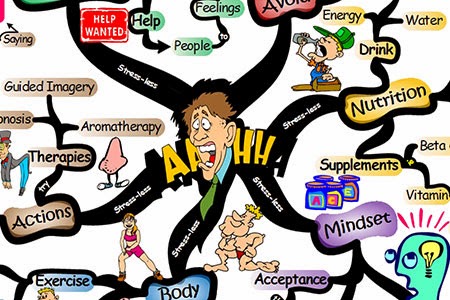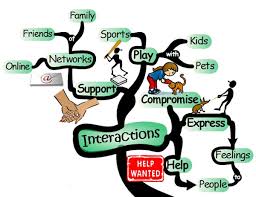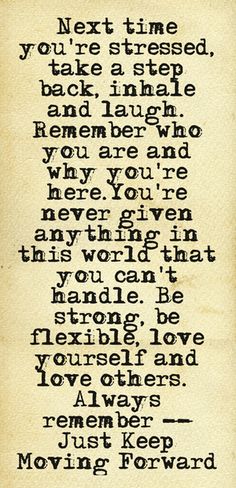Help Under Stress. Getting the Sting Out of It. (Part II)
In part I of this blog I wrote that our body's reaction to stressful situations or events that make us feel upset, threatened or out of balance is an automatic physiological response (fight, flight or freeze response).
by This email address is being protected from spambots. You need JavaScript enabled to view it., Clinical Psychologist
Psychologist Connie Lillas uses a driving analogy to describe the fight, flight or freeze response:
1. Fight--Foot on the gas: When you feel agitated, angry,
irritable, impulsive, overwhelmed.
2. Flight--Foot on the brake: When you feel withdrawn,
spaced out, depressed, and have low energy.
3. Freeze--Foot on both: You feel numb, paralyzed,
and overwhelmed.
The stress response is adaptive and also protective. For example, during an emergency, stress can save your life by giving you the extra energy to defend yourself, such as slamming on the brakes to avoid an accident. The stress response also helps you to meet various challenges, such as a presentation at work, or studying for an exam.
One could say then, that a healthy level of stress helps us to stay focused, energetic, and motivated. Unlike healthy stress which is good for you, prolonged and chronic stress has a negative impact on your mind and body, your mood and behaviors, your productivity, your relationships, and in general the quality of your life.
Chronic stress disrupts nearly every system in your body and can cause many physiological and psychological symptoms. It can suppress the immune system, increase the risk of heart attack and stroke, raise blood pressure, cause headaches, muscle pain, exhaustion, upset stomach, sleep or eating problems, urinary and sexual problems, and speed up the aging process. Furthermore, unmanaged long-term stress can even rewire the brain, leaving you more vulnerable to anxiety and depression and to other psychological problems. The most dangerous thing about stress is how quickly it begins to feel familiar, even normal and how easily anyone can get used to it.
Research done at Carnegie Mellon University led by psychologist Sheldon Cohen showed that stress impacts the body's ability to regulate inflammation, which results in chronic suppression of the immune system, thus leaving the body open to infections, and to the development and progression of illness.
Even though chronic stress is bad for you, you can protect yourself by recognizing its signs and symptoms early on and take the necessary steps to reduce its harmful effects. However, if you are currently experiencing stress and have serious medical or psychological symptoms, it might be helpful to seek immediate professional help.
People differ in their responses to stress
The impact of stress differs from person to person. Some people thrive under high stress while others crumble. For example, you may feel comfortable and even thrive to speak in front of an audience, while your friend might feel paralyzed. You may thrive under pressure and be very productive, while your colleague gets anxious and retreats.
Your stress tolerance and your ability to self soothe and be calm depends on various factors such as:
Your social support network – A loving family and good friends can be an enormous buffer against stress. On the flip side, isolation can make you more vulnerable to stress.
Your sense of control – The more in control you are or the more confident you feel internally to influence events in your life, the easier it feels to manage stress.
Your attitude and outlook – The more optimistic you feel about life, the easier it gets to manage stress.
Managing emotions – Your ability to express your feelings safely and constructively, helps you bounce back from stress much faster than bottling things up.
Your knowledge and preparation – The more you know about a stressful situation in advance and feel prepared the easier is to manage it (i.e., going for an operation).
Managing Stress
Although stress can be damaging, you are in charge of your response to stress and truly you have more control than you might think you do. What is also helpful is to
'Know thyself," "to be highly aware", because anything that stays unconscious can be equally as stressful as conscious issues can be. It is helpful to remember, that since everyone has a unique reaction to it, that there is no "one size fits all" solution to decrease the effects of stress.
So take the risk to experiment with different stress reduction techniques, focusing on what makes you feel calmer and peaceful. Start small, one tool at a time or a combination of tools if you can, and celebrate and enjoy your successes.
At times, it may feel easier to care for others in your life than for yourself. Yet, honoring yourself by taking even a short break to recharge and refuel is a gift to yourself and to others around you. It is about self-valuing, not about being selfish. Only when you refuel you can give without resentment and abundantly to others. Pick a stressor and see how the following stress management suggestions work out for you. Pay attention to how your mind and body responds when you begin to practice.
10 stress reduction tools to relax and stay calm

1. Meditation
Meditation has many health benefits. Rese arch shows that meditation increases positive emotions, resilience, life satisfaction and wisdom; boosts your immune system; decreases inflammation and pain. Although to some of you meditating may sound unfamiliar or difficult to do, with a bit of curiosity and practice it can become easy practice.
If your time is limited, try a five to ten mini-meditation. Slow down for a few minutes, preferably a few times a day, whether at work, in transit or at home and try to breathe in and breathe out slowly. Breathing from your diaphragm oxygenates your blood, which helps you relax almost instantly.
If you can take more time, then here's how one way to get started:
Choose a focus around you. Silently repeat a sound, a word, or a phrase ("peace," or "Om" or a number). Breathe easily and naturally. You may close your eyes or you can leave them open if you feel more comfortable that way. Any time your attention drifts and thoughts clutter your mind simply return to your focus word or phrase. Repeat from 10 to 20 minutes or longer. After you finish, sit quietly for a minute or so with your eyes closed. Then open your eyes, orient yourself to the room, wait another minute or two and notice how you feel and go on about your day.
If you are a beginner and want to experiment, you may also go to YouTube.com and choose one of the countless meditations there in order to begin practicing.
Try to practice meditating couple times a day for 10 to 20 minutes, preferably at a specific time each day.
Remember you always have your breath, so you can calm yourself down anyplace, anywhere.
2. Get Moving
Physical activity triggers the release of endorphins, the body's natural feel-good chemicals; improve your mood and your sleep. Although many people go to the gym, it is not the only way. Choose any physical activity you enjoy and love and reap the rewards.
3. Laughter
Laughter, whether watching comedy or listening to a friend's joke, relaxes the whole body and relieves tension. Laughter triggers the release of endorphins, increases immune cells and infection-fighting antibodies, and increases blood flow, which can help protect you against a heart attack and other cardiovascular problems.
4. Eat a balanced and healthy diet
A well-nourished body can defend much better against stress. Start your day with a healthy breakfast, reduce your caffeine and sugar intake, and cut back on alcohol and nicotine intake. Consult with a dietitian or nutritionist on what daily food intake might be best for your body.
5. Get Your Zzzzzzzss
Lack of sleep, a phenomenon of our busy lives, can make you irritable, tired and forgetful, impair your judgment, age your skin and contribute to weight gain. Keep your mind and body healthy and get enough restful sleep. If getting a good night's sleep is difficult, speak to a professional to figure out what keeps you awake.
6. Share and Connect

Nothing contributes more to chronic stress than isolation, alienation and emotional disconnection from ourselves and from others. Reaching out to connect with others, even for a few minutes a day, such as conversation with a neighbor, a colleague, or a friend can help you not to feel alone or isolated and bring you deeper aliveness and joy. We are really happier in relation and in connection.
You can also volunteer your time, take a fun and interesting class with others who share similar interests. If a social phobia or depression is getting in your way of reaching out, seek professional help.
7. Reduce Uncomfortable Emotions
Once you are aware of your emotions, even those that you would rather avoid or push away, begin to express them whether by writing them down in a journal or by sharing them with someone you feel safe and comfortable with. When expressed, emotions can loose their power and you avoid acting out on them out and hurt yourself and others.
8. Examine Your Beliefs
Take the time to stop, breathe, reflect, and examine those beliefs that keep you hostage and cause you stress. For example, if you believe others do not like you unless you please them all the time, you will focus on getting their approval, create dependency and live from a place of fear instead of a place of courage and self-value. Yet, if you can explore and change that belief, you can show up from a place of confidence and choose people who accept you for who you are instead of expecting you to please them.
9. Express Gratitude
Research shows that grateful people tend to be more optimistic and that expressing gratitude daily boosts your immune system and counters the effects of stress.
10. Just Say No
Be clear about your limits, what you can do and cannot, say no when you mean yes and stop trying to please everyone all the time.
Remembering that nurturing yourself and managing stress, is about celebration of your life and about respecting yourself. This healthy stance sends a message to others to treat us equally with respect and dignity!!!

Should you have any further questions please feel free to reach Dr Elizabeth Marmaras at
917-589-9385 or at Talk2DrLiz.com
Disclaimer: The purpose of this article is to help inform and educate its readers. It is in no way a substitute for psychotherapy services. If you experience the effects of continues stress please speak to your physician or mental health provider.
